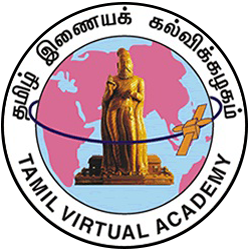Born in a Nellai Village in Tamilnadu and having
lost his parents as a boy, Su. Samuthiram pursued his education
against heavy; odds. A Government servant both at State and Central
levels, he retired from Madras Doordarshan as Chief Editor of news.
His first short story appeared in Anandavikkatan ‘ஆனந்த
விகடன்’ in 1975. The anthology of his short story Kuttam
parkkil (குற்றம் பார்க்கில்) won
the State Government award, and his Veril pazuthapala (வேரில்
பழுத்த பலா) the Sahithya Akademi, Imalia Award.
Samuthram has written since 1974 and his
output is comparatively a larger one. He has to his credit 20 novels.
And about 21 collections of short stories. His stories are essentially
an attempt at picturization of the life of the common man, his pains,
his failures, joys and sorrows. Oru Sathiyathin Azhukai (ஒரு
சத்தியத்தின் அழுகை), Maamaramum Maramkotthi paravaikalum (மாமரமும்
மரங்கொத்திப் பறவைகளும்), Manamkothi Manitharkal (மனங்கொத்தி
மனிதர்கள்) are some of his popular stories. His choice of
themes provides him with an opportunity of giving powerful expression
to his moral anger at the selfish exploitation of the larger society
by the self-seeking vested interests. His heroes and heroines are
in the main self-respecting men and women of integrity. They are
poor but hones. The humiliation this people suffer at the hands
of men in high positions is well brought out in his stories. Situations
and characters inevitably echo the author’s voice of justice.
All areas of human life figure thematically in
his fiction. Erring Government officials, Political offenders, Wrong-doing
Police Officers are often people who give him his stories. His thematic
spectra are vast and varied. His treatment of problems testifies
to his moral commitment to the unfortunate lot, caught up in their
emotional vortex.
The growing self-seeking tendency at the cost of personal
dignity on the part of the individual the decaying humanism and
the jolts that the social consciousness has suffered, the socio-cultural
setbacks caused by the growth of Neo-material prosperity are issues
that Samuthiran’s creative perspectives powerfully expose.
The story of Palaniswamy (பழனிச்சாமி)
a retired Deputy Secretary, who makes supreme sacrifice at the altar
of a public cause and whose body could not be got back from the
mortuary before bribe is paid the sadly though-provoking.
The story Ethir parimanam (எதி்ர்
பரிமானம்) is a poignant portrayal of a situation which obtained
fancied, late in the 40’s of 22nd century in which the Tamil race
getting reduced to a crowd of crawling psycho phants-a condition
they have inherited form their ancestry’s obsession with hero-worship.
The cure for this excruciating malody lies in Kaniyan Poongantanaar
(கணியன் பூங்குன்றனார்) sonnet yaathum
oore yaavarum kelir (யாதும் ஊரே யாவரும்
கேளீ்ர)். Ivarkalin Ulagam (இவர்களின்
உலகம்) narrates in a humorous vein the sequence of situations
where officials at their respective levels shamelessly display their
obsequiesness and regret later.
A note of satire pervades throughout his
work.
We are able to see in Samuthiran a writer
wedded to values and a fighter for social justice. He is angry at
all types of hypocrisy. An unfathomable deep-seeing curiosity guides
the organization of his material. He shares his concern for the
pains and predilections of the post-independence society at its
cross-roads struggling to emerge out of the age-hold evils of casteism,
political economic exploitation etc. With his contemporaries Jeyakantan
(ஜெயகாந்தன்), Te. Janakiraman
(தி. ஜானகிராமன்) and Na. Parthasarathy
(ந. பார்த்தசாரதி), His characters
come form all strata of society, the do-gooder, the prurient, the
high-placed, the idle, the vain - glorious all of them are well
delineated in a few clear Natal flashes.
Samuthiran’s satirical diction, choice for
the apt words ensure the lyrical cadence of his style and contribute
to the strength and power of his creative articulation.


